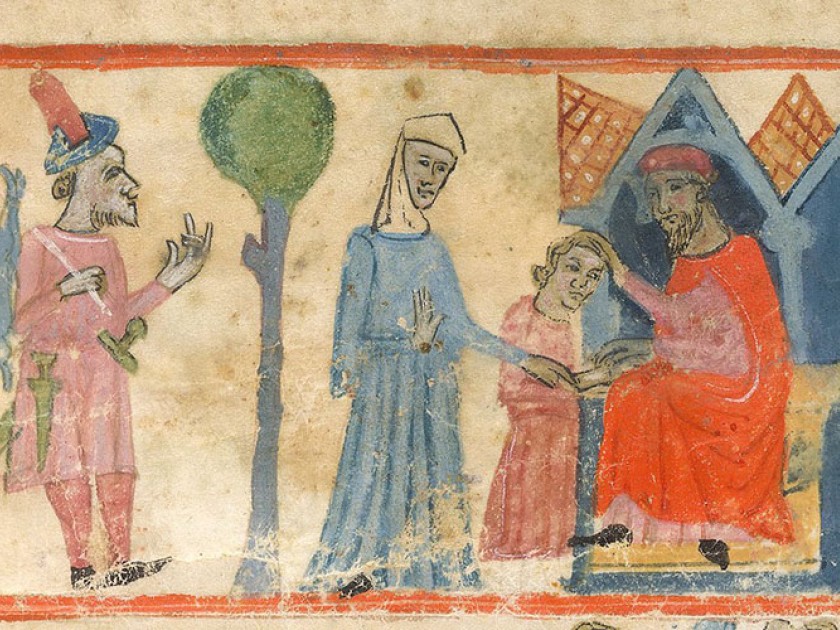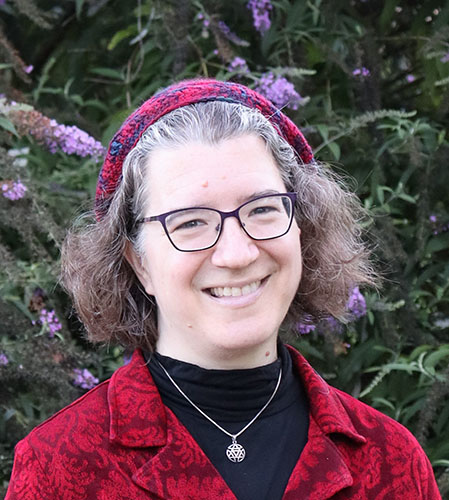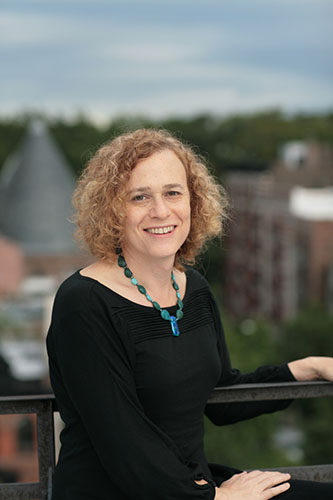
British Library, public domain, via Wikimedia Commons
Image description: Isaac blesses Jacob as Esau returns from his hunt, an animal slung over his shoulder and daggers strung to his pink tunic. Rebecca stands next to a round tree between her two sons, wearing a light blue tunic and a beige head covering and extending a hand to help Isaac with the blessing. The image is painted on beige parchment.
Julia Watts Belser: As I was writing Loving Our Own Bones, I kept coming back to the phrase “Disability Torah.” Those words were my touchstone, a way of naming a core orientation that runs through the book. My work is rooted in the assumption that disabled people have wisdom that matters — not in spite of our disabilities, but at least in part because of them. Disabled folks know something crucial about what it’s like to move through a world that rarely welcomes us. We bring a different kind of knowledge to the table, a knowledge born of dissident bodies and minds. When we bring those insights to the study of Torah, we can crack open new perspectives on spiritual life and religious experience.
Joy Ladin: That is the same assumption I brought to The Soul of the Stranger: Reading God and Torah from a Transgender Perspective. I know from my own experience of reading Torah as a trans person, and from the responses of non-trans people to the Torah readings I’ve shared, that transgender and nonbinary experiences of living outside or between binary gender categories can illuminate the Torah — and that, just as you remind us about disability wisdom, our experiences can help everyone recognize the ways in which we all sometimes feel alienated from the roles and identities we are assigned.
JWB: Yes, exactly. Disability Torah can also be deeply transformative for people who don’t identify as disabled, in part because we all experience moments where our bodies and minds don’t match society’s expectations. But while Disability Torah feels deeply aligned with queer and trans textual creativity in many ways, there’s also an interesting point of difference. Queer and trans Jews often grapple with the problem of absence, of not seeing ourselves represented in the text. With disability, we have the opposite problem. Disability is everywhere, but it’s often represented in ways that are quite alienating.
Isaac’s blindness is a potent example. As an ancient Israelite patriarch, Isaac is expected to pass on his blessing to his eldest son, Esau. But Isaac ages, and his eyes become dim. His wife and younger son use Isaac’s disability against him, tricking him into giving the blessing to Jacob instead. Jacob wears his brother’s clothes to shroud himself in Esau’s scent; he wraps his hands in goat skin to mimic his brother’s rough skin. Isaac is made to play the fool, the bumbling blind man — the one who can’t even distinguish between his own sons.
For years, that text felt too toxic to touch. It felt like a caricature, an obvious misnaming of disability experience. It also felt like a devastating confirmation of disabled people’s vulnerability. I flinch from both of these narratives: that disabled people are laughing stocks or tragic figures, that we’re always at risk of being used.
JL: For me, the story of Jacob dressing up as his more masculine brother, Esau, to trick their father into giving him the firstborn blessing was extremely painful. I never wanted to identify with Jacob, a character I really dislike. But as a transgender child pretending to be a boy I knew I wasn’t, I felt I had to identify with Jacob, to recognize that I, like Jacob, was using the conventions of masculinity to trick my parents into giving me blessings they wouldn’t have given me if they knew who I really was. I didn’t read the story as being about Isaac’s blindness; I saw it as being about Jacob’s dishonesty toward his parent, his betrayal of his father’s trust for his own gain.
It wasn’t until many years later, when I was openly living my trans identity, that I finally realized that I was in a double bind: I was trying to act like the boy my parents wanted me to be, while simultaneously blaming myself for lying to them and betraying their trust. My feeling of betraying my parents was internalized transphobia, and a way of avoiding my anger at them for not being able to recognize or accept my true self. When I found compassion for my child self, I was able to recognize that Jacob was also doing what he had to do to become the person he was created to be.
The crucial work — the work that’s an obligation for all of us — is to push for deep, collective cultural change.
JWB: I find that so painful, the way you both deeply disliked Jacob and identified with him. When I read this story, I feel deep empathy for Jacob. I don’t see him as a deceiver. I see him as a person facing an excruciating question: am I allowed to be my true self?
It’s a powerful question, and not just for queer and trans folks. So many disabled people have also learned that we have to hide. We’ve learned to shrink ourselves, to minimize our difference, or to expend huge amounts of energy trying to pass as nondisabled.
When Jacob faces this question, he doesn’t reveal himself. I see that as a tragedy. But to read that moment as Jacob’s failure overlooks the fact that tragedy is baked into the whole system. Ancient Israel has a profound cultural investment in the system of primogeniture, the legitimacy of the firstborn son. That’s what makes it impossible for Jacob to come before his father as himself. Creating a world where Jacob can receive his father’s blessing and be himself requires dismantling the oppressive structures that are preventing that possibility.
That’s what I wish I could say to your younger self, and what I want to say to disabled folks who are also struggling with our bodies and minds in all their complexity. Claiming our identities and saying yes to ourselves can be a powerful catalyst for transformation. But it’s easy for that to feel like just another private burden, one more way that we aren’t measuring up. The crucial work — the work that’s an obligation for all of us — is to push for deep, collective cultural change.

Image description: A photograph of Julia Watts Belser, a white Jewish woman with curly brown hair. She’s wearing a patterned red blazer and a red kippah (beret). In the background is a tree with purple flowers.
JL: I agree. This series of tragedies — Jacob’s need to hide who he is from his own father, Isaac’s inability to recognize Jacob or pass his blessing on to the son he meant it for, Esau’s loss of the blessing that his father had been holding for him — is a symptom of systemic failure. The sense of scarcity, that only one brother can receive the blessing, is built into the biblical form of binary gender. Even though Jacob is born literally holding onto Esau’s heel, the system defines Esau as the firstborn, and Jacob as his lifelong subordinate.
Male supremacy, racism, ableism, and many other oppressive systems operate according to this same either/or, winner-takes-all principle. Those at the top of the hierarchy are entitled to everything, while those who aren’t are entitled to nothing but subordination.
Isaac is generally thought of as the most conservative of the biblical patriarchs, whose main achievement consists of maintaining and passing on what he inherits from Abraham. Unlike his wife, Rebekah, who comes up with the plan to subvert primogeniture by having Jacob impersonate Esau, Isaac never thinks outside the system, never imagines that his life or family could work any other way. That lack of imagination leads to Isaac’s most tragic failure: his insistence that he has only one blessing to pass on, that after he has blessed Jacob by mistake, there’s nothing left for Esau.

Image description: A photograph of Joy Ladin, a white Jewish woman with curly blonde hair. She’s wearing a black shirt and turquoise necklace. In the background is a blurred cityscape.
JWB: For me, that’s a huge part of the tragedy: the way in which we often end up accepting unjust, brutal systems as part of the unquestioned framework of our world. But as I read this story, I also find a potent moment of possibility, a glimmer that might let us imagine otherwise.
In Genesis 27, Isaac asks Jacob about his identity several times, giving Jacob chance after chance to tell him the truth. As we’ve talked about, Jacob doesn’t dare to appear before his father as his true self. The last time Isaac asks, “Are you really my son Esau?,” Jacob answers in the affirmative. He tells his father a lie, and Isaac goes ahead and gives him the blessing. But there’s something curious about the Hebrew, something that feels like it holds a second possibility. When Jacob answers his father, he speaks a single word. He says, “Ani,” meaning “I.”
For me, that final word feels like the doorway to a different world, one where Jacob can let go of the imperative to hide, where he can receive his father’s blessing without having to deny his own identity. I hold that verse like a pearl of possibility: that disabled, queer, and trans folks will find and forge spaces where we can unmask, where we can honor the truth of our own lives, where we can trust that we’ll be cherished and held in our fullness. That’s the blessing I want, for all of us.
Julia Watts Belser is a rabbi, scholar, and spiritual teacher, as well as a longtime activist for disability, LGBTQ, and gender justice. She is a professor of Jewish studies in the Department of Theology and Religious Studies at Georgetown University and core faculty in Georgetown’s Disability Studies Program, as well as a senior research fellow at the Berkley Center for Religion, Peace, and World Affairs. Author of Rabbinic Tales of Destruction, among other scholarly books, she has held faculty fellowships at Harvard Divinity School and the Katz Center for Advanced Jewish Studies at the University of Pennsylvania. She’s also an avid wheelchair hiker and a lover of wild places.
Joy Ladin, the first openly transgender employee of an Orthodox institution, has long worked at the intersection of trans identity, Jewish identity, and literature. She is the author of three books on transgender issues, including new published Once Out of Nature: Selected Essays on the Transformation of Gender; a memoir of gender transition, National Jewish Book Award finalist Through the Door of Life; and a groundbreaking work of Jewish trans theology, Lambda Literary and Triangle Award finalist, The Soul of the Stranger: Reading God and Torah from a Transgender Perspective. She has also published eleven books of poetry, including newly published Family; Shekhinah Speaks; and National Jewish Book Award winner The Book of Anna. A nationally recognized speaker on transgender issues, her work has been recognized with a National Endowment for the Arts Fellowship and a Fulbright Scholarship, among other honors. Her writings, talks, and upcoming events are available at www.joyladin.com.



